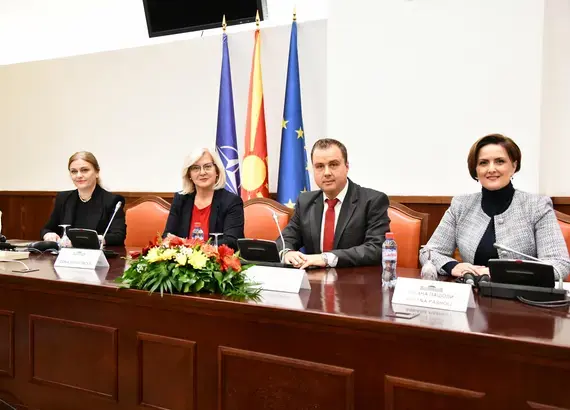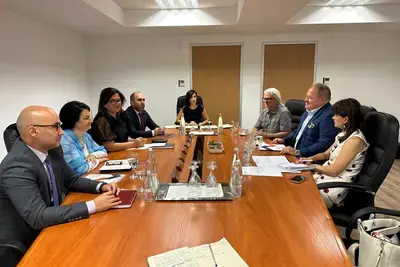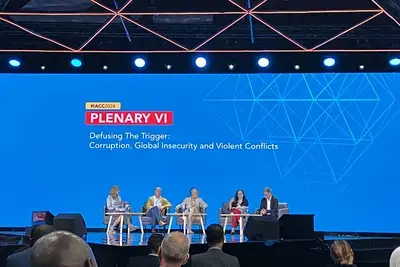
Success Story
North Macedonia: Newly Established Parliamentary Group Committed to Curbing Corruption
Fifty-six percent of citizens of North Macedonia believe crime and corruption are the most important issues the current government should address, according to field research undertaken as part of the Parliament Support Programme (PSP), a project of the Government of Switzerland, and implemented by NDI. The new governing coalition in North Macedonia, led by the center-right VMRO-DPMNE party, which came to power after winning both parliamentary and presidential elections in the spring of 2024, campaigned on a promise to fight against corruption and uphold the rule of law, among its top priorities. According to the October 2024 European Union (EU) Commission Country Progress report on North Macedonia, “corruption remains prevalent in many areas and is an issue of serious concern,” and Transparency International’s 2023 Corruption Perceptions Index (CPI) ranked North Macedonia 76th among the 180 countries, with a score of 42 out of 100. While North Macedonia has ratified all relevant anti-corruption conventions, with the EU Commission report noting, “The institutional framework for the fight against corruption is in place and is satisfactory in terms of preventive measures,” corruption still deeply affects Macedonian society.
To address the significant issue of corruption in North Macedonia and noting that it is amongst the main barriers to EU accession, the Assembly of the Republic of North Macedonia has a fundamental role to play. This includes strengthening domestic anti-corruption legislation, bolstering internal controls, and collaborating on innovative, cross-party approaches. Moreover, parliament can play a crucial role in combating corruption by ensuring transparency, accountability, and oversight of the executive branch, strengthening democratic governance, and building public trust.
Over the past few years, with the technical support of NDI, members of parliament (MPs) have begun working across party lines through informal issue-based multi-partisan parliamentary groups on such issues facing youth, women, and Roma communities, as well as on environmental sustainability. In 2023, a group of four parliamentarians from different political parties (Arbana Pasholi, member of the Democratic Union of Integration (DUI); Artina Qazimi, member of the Alliance of Albanians; Ljupcho Prendzov, member of VMRO-DPMNE; Sonja Mirakovska, member of the New Social Democratic Party (NSDP) including the ruling coalition and opposition parties, expressed a keen interest in formalizing the Assembly’s anti-corruption efforts. With the technical support of NDI, the four MPs established the Inter-party Parliamentary Group Against Corruption (Anti-Corruption Caucus) in the Assembly. This initiative was eventually supported by the majority of MPs.
The Anti-Corruption Caucus is an important tool in North Macedonia’s fight against corruption. As a cross-party initiative, it provides a forum for working together to tackle corruption in a coordinated and targeted manner. In discussions with NDI staff, parliamentarian and Anti-Corruption Caucus member, Dafina Stojanovska (VMRO-DPMNE) explained how the initiative strengthens responsiveness to the Macedonian citizens, noting, “the activities of this Group are important in order to make a statement that Members of Parliament, who are elected by the people, react and are sensitive to the most pressing societal issue, which is corruption.” Similarly, Arbana Pasholi, of the Albanian minority political party Democratic Union for Integration (DUI), stated that, “the cross-party approach enables a better trust-building process and we are aware that by working together we can accomplish our mutual goal - a corruption-free political and public life.”
In early 2024, before the parliamentary and presidential elections in April and May, the Anti-Corruption Caucus convened a series of strategic planning meetings, with technical support from NDI, with the members and relevant assembly staff. There was broad consensus on the necessity of the Assembly’s supervisory power and the important advisory role that the Anti-Corruption Caucus could play. The Anti-Corruption Caucus, with input from the State Commission for Prevention from Corruption (SCPC), the State Audit Office (SAO), and civil society organizations (CSOs), identified several key areas of common interest, such as reforms to the public health system, public administration, and the construction and energy sectors.
Following the 2024 parliamentary election of North Macedonia, MPs sought to reestablish the Anti-Corruption Caucus. The caucus was reestablished in July 2024, with 55 MPs signing on as members. MPs held the constitutive session on October 21, 2024, at which the group reaffirmed its commitments and elected co-chairs from both the majority coalition and the opposition block. After the session, the co-chairs held a strategic planning session, with technical support from NDI, and attended by representatives of the group, the SCPC, the SAO, the Vice President of the Government, and civil society organizations. The parties discussed the future directions of the Anti-Corruption Caucus’ work and the expectations they have from the Assembly in addressing issues of corruption and exercising its legislative and oversight powers.
Caucus Co-Chair Ljupcho Prendzov (VMRO-DPMNE) stated that the Anti-Corruption Caucus “is the perfect opportunity to fulfill the promises that [MPs] gave people in the campaign,” through an “objective and data/evidence based effort.” Prendzov noted that NDI serves the unique role in North Macedonia of bringing “all political parties together to work.”
The Anti-Corruption Caucus will continue to be supported by the Parliament Support Programme (PSP), a project of the Government of Switzerland, and implemented by NDI. The program supports the Assembly’s legislative and oversight roles, as well as assists in promoting more consensus-oriented and inclusive decision-making and debate. Through the PSP, NDI introduced civil society stakeholders to the Anti-Corruption Caucus, who welcomed its potential to complement and bolster their anti-corruption work. Through the PSP, the Anti-Corruption Caucus can continue to collaborate and confront complex issues with new innovative approaches to drive necessary reforms in order to respond to constituent needs and fulfill EU accession requirements.
NDI’s engagement with this program is implemented with the support from the Swiss Agency for Development Cooperation - funded Parliament Support Programme.


